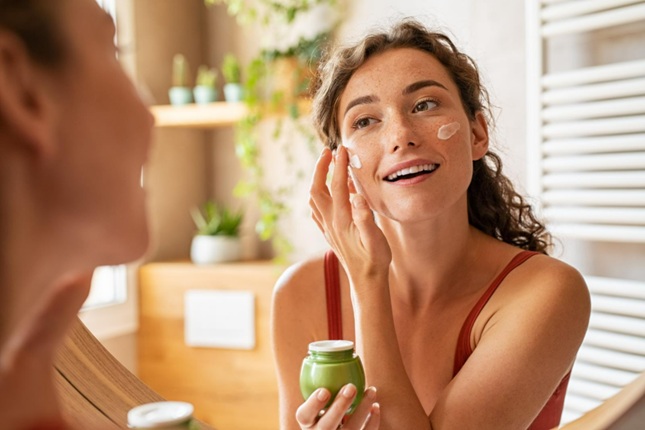The skin naturally changes as the years progress, and these changes can start to feel more noticeable in the 30s and 40s. Fine lines may appear, firmness can gradually lessen, and radiance might not seem as bright as before.
While these shifts are part of the natural process of aging, many people look to skincare for support in maintaining healthy, resilient skin. Not every ingredient provides proven results. However, a few have been consistently recognized by dermatologists and researchers for enhancing skin’s texture, tone, and overall appearance.
Below are some of the most reliable anti-aging ingredients that have earned trust for their effectiveness and safety when used correctly.
1) Retinol
If your skin looks tired or dull, retinol is one of the most trusted ingredients to restore vibrancy.
Retinol, a vitamin A derivative, is among the most studied and recommended ingredients for anti-aging care. It works by speeding up cell turnover, helping to shed dull surface cells so fresher, more youthful-looking skin can appear. Over time, consistent use of retinol can help minimize fine lines, refine texture, and even out uneven pigmentation.
Although highly effective, retinol can cause dryness or irritation for some individuals, especially when first introduced into a routine. This is why starting with a lower concentration and using it a few times weekly is often suggested. Pairing retinol with a soothing facial moisturizer can also make the adjustment period more comfortable.
2) Peptides
Peptides are short chains of amino acids that act as building blocks for proteins like collagen and elastin. These proteins are essential for keeping skin firm and supple. As collagen production naturally declines with age, incorporating peptides into your skincare routine can help your skin look firmer, plumper, and more resilient.
What makes peptides especially appealing is that most skin types generally tolerate them. Unlike more potent active ingredients, peptides typically don’t cause irritation, making them suitable for sensitive or reactive skin.
To see how peptides are included in advanced skincare, you can look at a OneSkin review, where peptides are often highlighted as a core anti-aging component. The goal here is to find a formula that works well with your skin type and helps maintain long-term resilience.
3) Vitamin C
When your complexion looks lackluster or uneven, vitamin C can help revive brightness, smooth texture, and protect against environmental stressors. Its role in anti-aging care goes beyond improving radiance. This antioxidant helps neutralize free radicals, which can damage collagen and speed up visible signs of aging. Regular use of vitamin C serums has been linked to a more even skin tone, reduced dark spots, and improved firmness.
Stability can be a concern with vitamin C since it can degrade when exposed to light or air. To ensure potency, look for formulas packaged in opaque, airtight containers. Combining vitamin C with sunscreen during the day also enhances protection against environmental damage.
4) Niacinamide
Do you struggle with dryness, redness, or uneven skin tone? Niacinamide, or vitamin B3, is a versatile ingredient that strengthens the skin’s barrier. A stronger barrier helps retain hydration, block irritants, and promote a more balanced, healthier-looking complexion.
In addition to its calming effects, niacinamide can minimize the look of enlarged pores and improve uneven tone. It tends to pair well with other active ingredients, such as retinol, vitamin C, and peptides, making it simple to add to most skincare routines.
5) Hyaluronic Acid
Hydration plays a central role in how youthful the skin looks and feels. Hyaluronic acid, a molecule naturally present in the body, has the remarkable ability to hold its weight in water many times. Applied topically, it helps replenish moisture, making skin look smoother and more supple.
Because it draws water into the skin, hyaluronic acid can instantly improve the appearance of fine lines caused by dehydration. It works well layered under moisturizer and can be used both morning and night without risk of irritation.
6) Alpha Hydroxy Acids (AHAs)
Alpha hydroxy acids, such as glycolic and lactic acids, are exfoliants that gently remove dead skin cells from the surface. This process encourages a smoother texture and brighter appearance, and helps products applied afterward absorb more effectively. It’s also beneficial for fading the appearance of acne scars, which is a concern after breakouts have healed. Over time, AHAs can soften the look of fine lines and improve overall radiance.
And since exfoliation can sometimes cause sensitivity, it’s essential to use AHAs in moderation. For those who are new to these ingredients, starting once or twice a week is usually sufficient. Sunscreen with at least SPF 30 should always be applied afterward during the day to protect freshly exfoliated skin.
7) Coenzyme Q10
Coenzyme Q10, often referred to as CoQ10, is a naturally occurring antioxidant in the body. Levels decline with age, which may leave skin more vulnerable to oxidative stress. Applied topically, CoQ10 helps defend against environmental damage while supporting the skin’s ability to remain firm and smooth.
It’s often found in moisturizers or serums and works well as part of a preventive approach to anti-aging care. Its gentle nature makes it suitable for most skin types, including sensitive skin.
8) Ceramides
Ceramides are lipids that naturally occur in the skin’s outer layer. They help lock in moisture and shield against irritants. As skin matures, ceramide levels decline, which often leads to dryness and discomfort. Replenishing them through skincare can noticeably improve how the skin feels and looks.
Ceramide-based products are especially helpful for dryness, rough patches, and sensitivity. They strengthen the skin’s protective layer, improving hydration and allowing other active ingredients to work more effectively.
Final Thoughts
Skin aging is a natural process that no one can escape, but using the right ingredients can help slow its visible effects. Remember, lasting results rarely come from a single ‘miracle’ formula. Instead, it’s the consistent use of a few well-chosen beauty products with proven actives that makes the biggest difference.
Take time to understand your skin’s unique needs, choose ingredients that work best for you, and introduce them gradually into your routine. With patience and consistency, you’ll give your skin the support it needs to stay healthy, resilient, and radiant for years.





